|
.jpg)
Henry M.
Seggerman
President
International
Investment
Advisers | By
Henry M. Seggerman
President of International
Investment Advisers
Like water transformed into wine at the Wedding at Cana, common shares in Korea right now are being transformed from casino chips into shares of ownership. In just over two years, the KOSPI has risen 120%. During this time, we have also seen the shares of Korea’s leading refiner, SK Corp., rise a staggering 1,030%. These two tremendous rallies reflect the same thing – Korea’s newfound respect for the fact that a share of voting stock is in fact a share of ownership of the company.
When the multibillion-dollar SK Global fraud was exposed, SK Corp.’s stock sank to KRW 6,130, trading at a PE below 1x. Out of nowhere, a mysterious distressed-asset fund, Sovereign Asset Management, lured by this irresistible bargain, bought a 14.99% stake in the company and became its largest shareholder. CEO Chey, Tae-won was convicted of fraud and sentenced to three years in prison, and Sovereign nominated a new Board of Directors for the 2004 AGM. This year, Sovereign came a tiny 10% away from ousting the founding family from the chairman’s post of a chaebol blue chip. That is a first in Korea. The concept of control premium has taken on a whole new meaning.
For decades, controlling shareholders have soaked the equity markets repeatedly, based on a Monopoly-Money delusion that they could exercise control by manipulation, despite perilously anemic stakes often below 1%, relying on spidery circular shareholdings and the utterly nonsensical concept “Major Shareholder.” They also engaged in accounting fraud and wanton, value-destroying malinvestment. Now, all that abuse is coming home to roost, as they discover poor management drives down the share price to bargain-basement levels, attracting international bottom-fishers like Sovereign. So, going forward, further dilutive rights issues will be impossible for key blue-chips, and executives will think twice before value destruction.
Activist shareholders can complain about the Appeal Court’s overturning Chey, Tae-Won’s sentence a few weeks ago as an indication of chaebol reform lacking in stamina. However, they cannot complain about Kang, Chul-kyu across the street at the Fair Trade Commission, who correctly pointed out that SK Corp.’s founding family owns a paltry 0.97% of the company it controls. What’s great is that every time the FTC comes down on the chaebols, the stock market goes up. When chaebol fat cats intone gravely, “These investigations will hurt the stock market and economy,” don’t believe a word of it. The opposite is true. When the FTC accused Lee, Kun-hee of controlling Samsung Electronics with a measly 0.28%, the stock went UP, not DOWN.
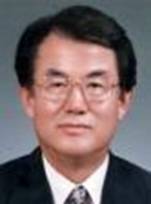
Fearless: FTC’s Kang, Chul-kyu
This is entirely logical, even fundamental. Stock prices go up due to the value of tangibles, receivables and financial assets. They do NOT go up because nobody dares challenge someone with less than 1% ownership’s control. Whenever control of those tangibles, receivables and financial assets is questioned in any way, the stock price will rise to reflect those values. When they are controlled in an undemocratic way, the stock price is depressed. Soon, chaebol ownership fabrications will prove as durable as a house of cards in gale-force winds.
Sovereign was a real wake-up-and-smell-the-coffee alarm for corporate Korea, leading management to realize they could actually lose their jobs. For those many, many Korean companies which trade at discounts to international peers, as a result, we are seeing a frenzy of panic share buybacks, especially since 2003. These companies are desperate to buy shares just to establish some kind of minimal respectability.
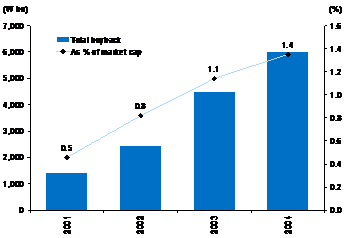
A frenzy of stock buybacks
Another smart move from the Korean government this year was the creation of a Class Action Lawsuit system. This is driving money into the stock market, too, because a company whose Directors can be held accountable in a court of law trades closer to the fair value of its assets and future cash flows. Again, when chaebol fat cats intone gravely, “Class Action Lawsuits will hurt the stock market and economy,” don’t believe a word of it. The opposite is true. Countries with Class Action Lawsuits like the US and UK trade at higher market cap-to-GDP than those that do not, such as France and Germany.
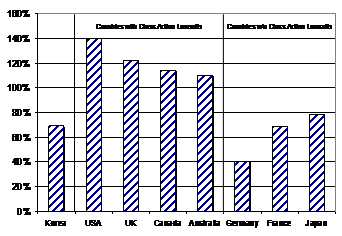
Countries with Class Action Lawsuits have a higher market cap-to-GDP.
The KOSPI rallied 120% when Sovereign became the largest shareholder of a chaebol blue chip. It will rally again when a large judgment is collected personally from a company Director in a Class Action Lawsuit. Given the EPS growth of Korea’s listed companies, there is no reason the KOSPI cannot trade at the PE ratio of Australia, which has a Class Action Lawsuit system. That would imply KOSPI 2,200.
Sovereign Asset Management, a foreign investor, was only a messenger of change. Whilst foreign buying has remained firm, this rally has been marked by a dramatic surge in domestic equities buying. Traditional equity-type beneficiary certificates at the investment trust companies have shot up five trillion won in a few short months. The banks have launched the new installment equity-type funds, which have risen by the same amount, from zero.
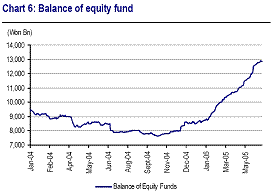
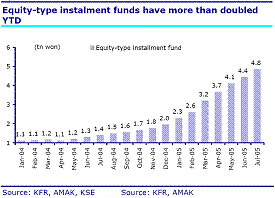
And finally, Korea’s pension funds, which in the past have had an abnormally low equities allocation – 7% compared with 65% in Australia, for example – have finally begun increasing their weighting in stocks. UBS expects 450 trillion won in pension assets to amass in the next five years, so the potential in this is enormous.
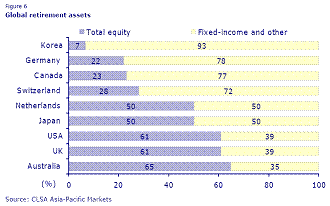
Australian pension funds ten times more exposed to equities than Korean.
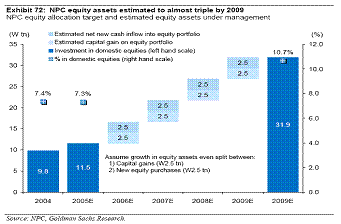
Another 20 trillion won for equities in the next four years.
If you consider that Koreans now own little more than half of their own stock market – compared with Canadians and Brazilians, who own 93% of theirs – then it’s not unrealistic for us to look forward to KOSPI 2,200. The average Korean has harbored for many years negative sentiment towards company owners and viewed the stock market as a casino. As a result of the corporate focus on accountability, the casino view is quickly being replaced with knowledge that voting stock really votes.
Does this mean these waves of new Korean retail and institutional stockholders coming in will side with shareholder activists, oust founding families, and take company Directors to court? The answer is that it doesn’t matter. In the last 2½ years, it has become clear that shareholders in Korea have the ability to oust founding families controlling chaebols and win judgments in court against company Directors found guilty of shareholder abuse. The obvious result of these changes is that company management throughout Korea is focused more than ever before on returning value to shareholders, because finally they are being held accountable. After all, it’s the shareholders who actually own the companies, not the management, not the founding families. It doesn’t matter if or how you vote them, stocks are simply a much more attractive investment than ever before.
|


